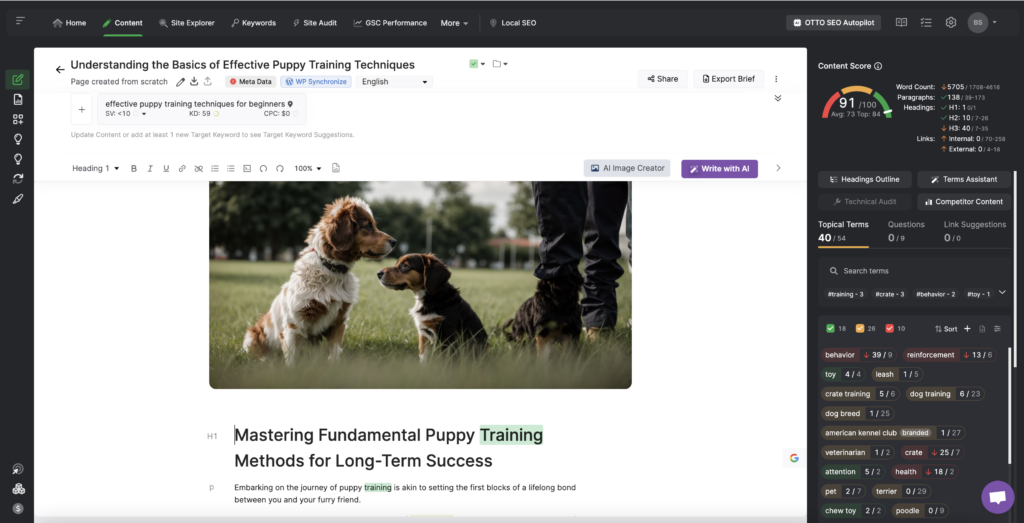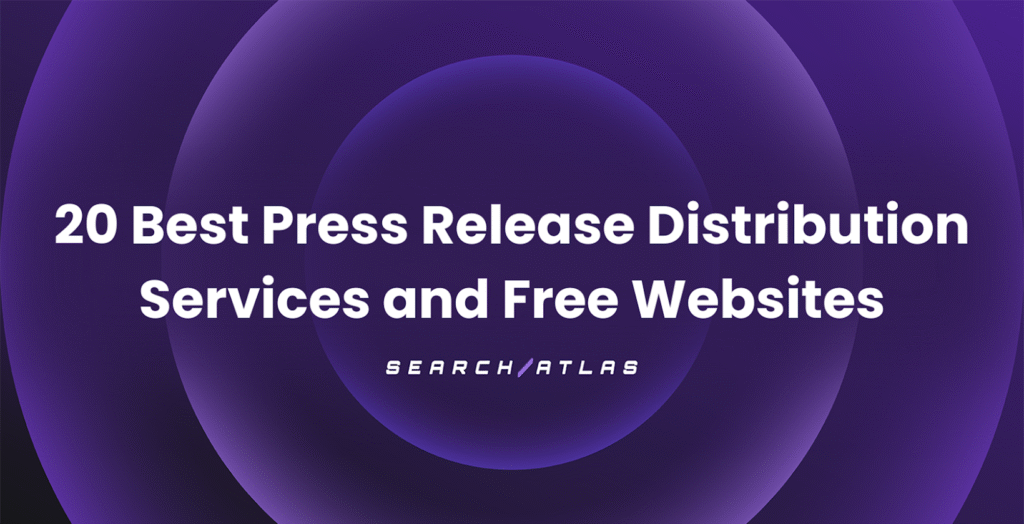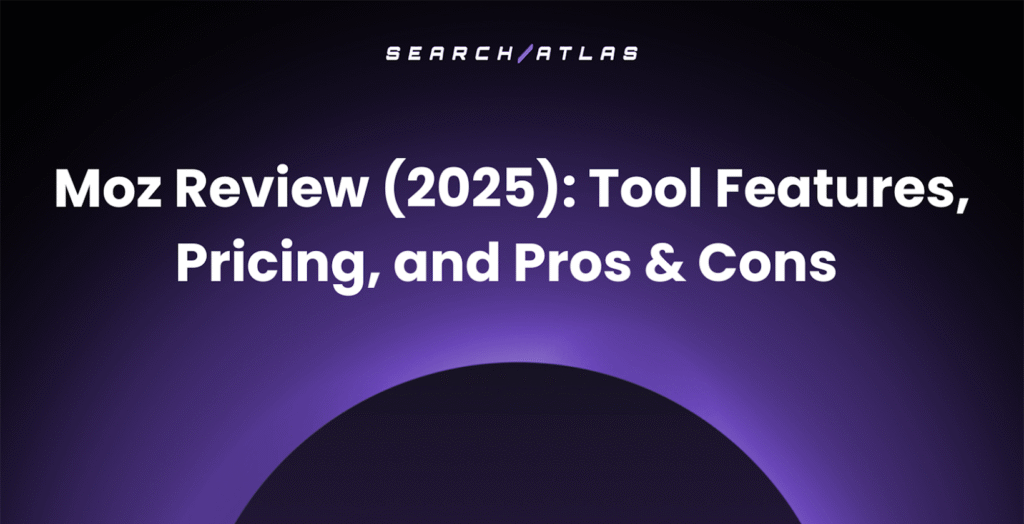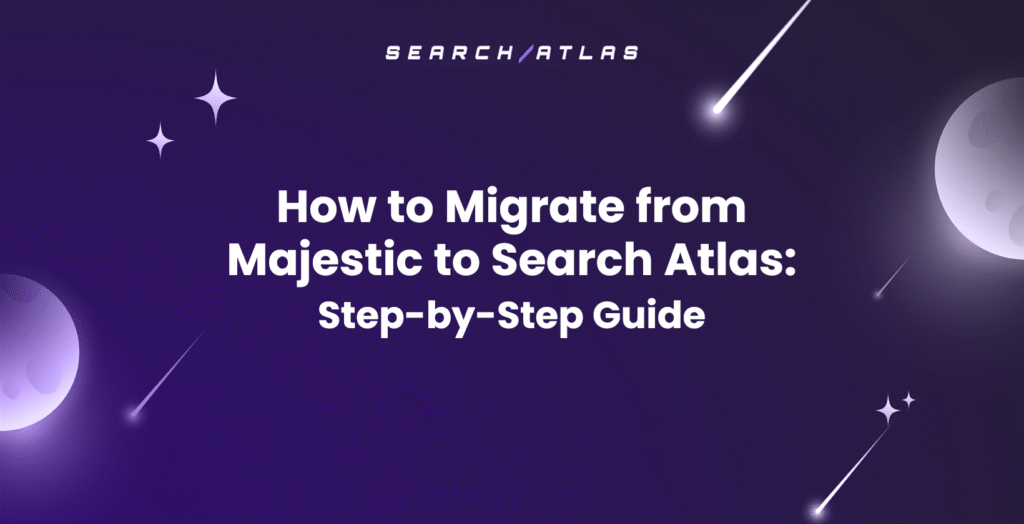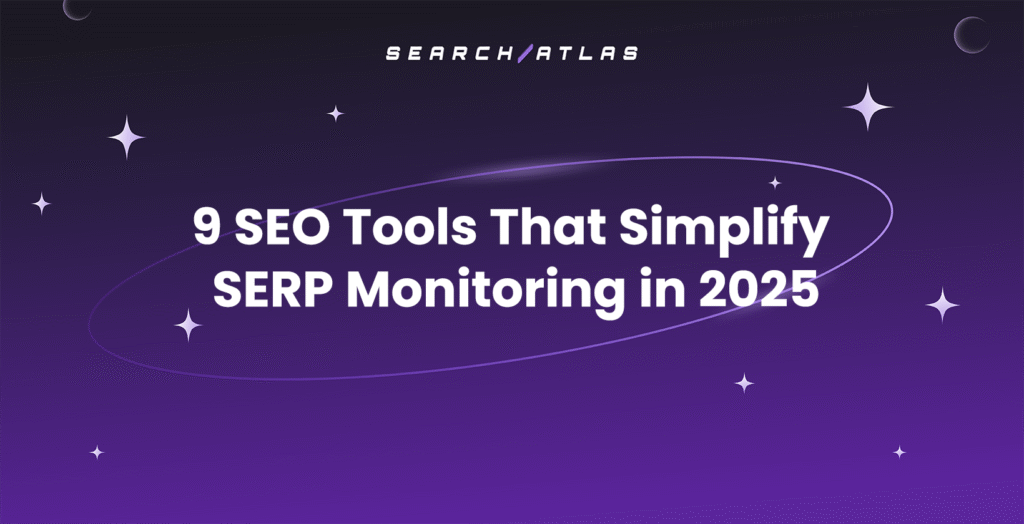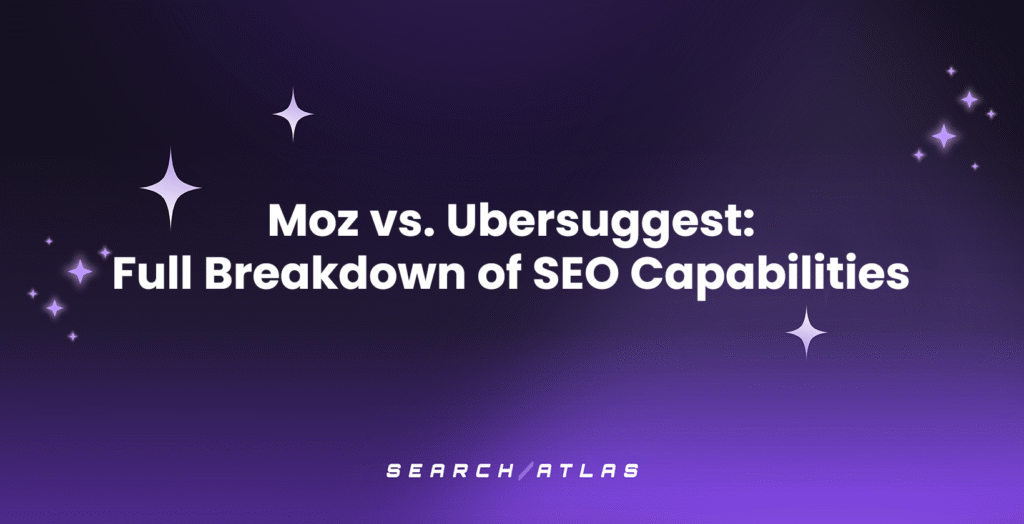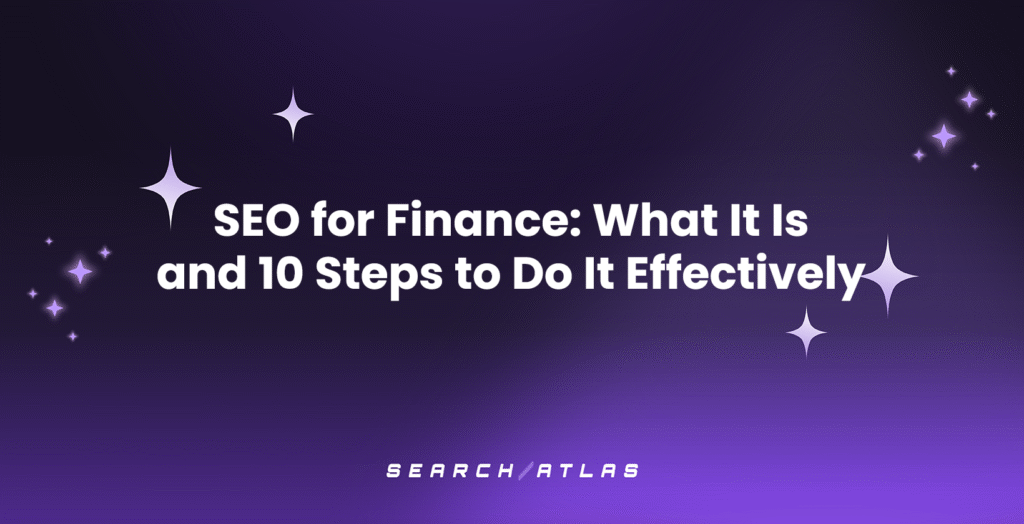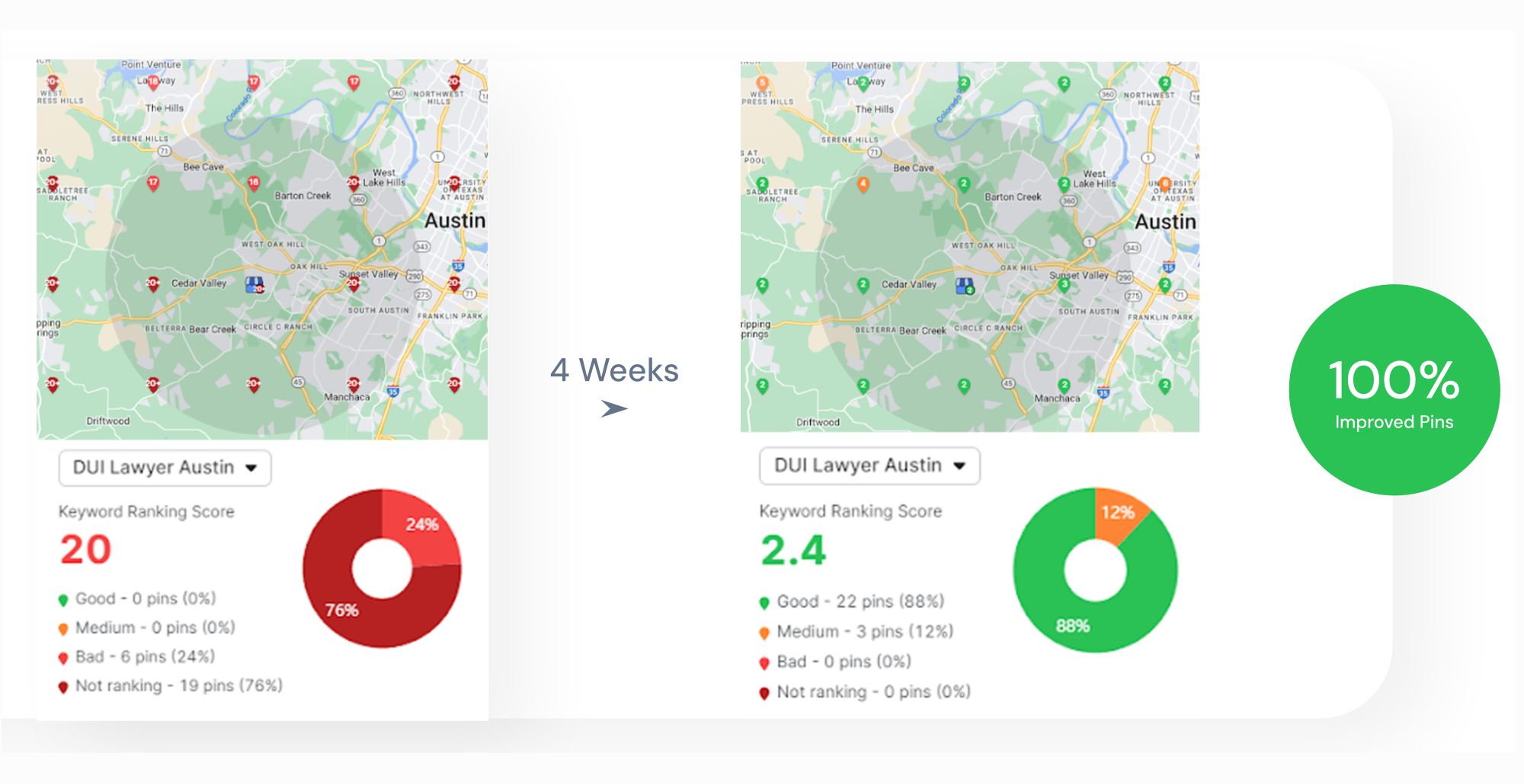Off-page SEO refers to the process of improving a website’s authority and relevance through external factors. Off-page search engine optimization involves techniques such as link building, digital PR, content marketing, local SEO, brand building, and brand mentions to establish a strong foundation for search visibility.
Our off-page SEO guide explains the best practices and tactics for earning high-quality backlinks, increasing brand awareness, and signaling relevance to search engines, ultimately leading to higher rankings and improved online presence.
What Is Off-Page SEO?
Off-page SEO, or off-site SEO, encompasses all optimization activities performed beyond your website’s boundaries with the explicit purpose of improving search rankings and overall digital presence. Off-page SEO is concerned with building your site’s authority, relevance, and trustworthiness through external signals.
The primary goal of off-page SEO is to convince search engines that your website offers valuable content and deserves prominent positioning in search results. When authoritative websites link to your content, search engines interpret these links as votes of confidence, indicating that your information is reliable and useful. The quality of these external signals matters significantly more than quantity, with a single link from a high-authority website potentially carrying more weight than dozens of links from low-quality sources.
The main components of off-page search engine optimization include link building strategies, digital PR campaigns, content marketing initiatives, local SEO optimization, and brand building strategies.
What Is Off-Page Optimization in the Overall SEO Strategy?
Off-page optimization in the overall SEO strategy is a critical component, complementing on-page and technical SEO efforts to maximize search visibility. Off-page optimization provides an external reference that confirms the quality and relevance signals established through on-page optimization. The alignment between off-page and on-page SEO creates a cohesive strategy that addresses all aspects of search engine algorithms.
Off-page in SEO contributes to over 50% of ranking factors. This substantial influence stems from search engines’ reliance on external signals to verify a website’s authority and relevance. While on-page SEO ensures content quality and keyword optimization, off-page SEO validates these efforts through external endorsements that search engines interpret as independent verification of value. This makes off-page optimization indispensable for achieving sustainable SEO performance in competitive markets.
What Is the Importance of Off-Page SEO?
The importance of off-page SEO lies in its ability to build website authority, credibility, and search engine trust through external validation. Off-page SEO serves as the reputation management system for your website, establishing its position and influence within your industry’s online ecosystem. Search engines like Google analyze how other websites reference and link to your content, how users engage with your brand across the web, and how your site compares to competitors in the same industry.
When executed effectively, off-page SEO creates a ripple effect that influences multiple aspects of online visibility.
From improving search engine rankings to increasing brand awareness and reinforcing domain authority, the benefits of an off-page SEO strategy extend across various digital channels. The 6 key benefits of a robust off-page SEO strategy are listed below.
- Boosts rankings. Off-page SEO establishes authority through external signals, making the website more likely to rank higher in SERPs (Search Engine Result Pages). Websites with strong backlink profiles typically achieve better rankings for competitive keywords compared to those with similar on-page optimization but weaker off-page signals.
- Increases brand recognition. Off-page SEO expands reach and visibility by building a strong presence across multiple platforms. Off-page SEO activities generate sustained brand awareness across various online channels, creating multiple touchpoints for potential customers to discover your business.
- Strengthens domain authority. Off-page SEO enhances website credibility through high-quality backlinks and brand mentions. Websites with diverse, relevant backlink profiles typically show stronger growth in authority metrics over time compared to those with limited external signals.
- Shows trust signals to search engines. Off-page SEO reinforces reliability and expertise by earning endorsements from authoritative sources. Google’s algorithms interpret quality backlinks as trust signals that help validate your website’s credibility in your industry or niche.
- Drives referral traffic. Off-page SEO generates relevant traffic from external websites, increasing engagement and potential conversions. Well-placed backlinks from industry publications can deliver highly targeted visitors who are already interested in your topic or offerings.
- Expands online presence. Off-page SEO builds a strong digital footprint through strategic outreach and partnerships. Effective off-page SEO creates multiple discovery pathways to your website, increasing the opportunities for potential customers to find your business online.
By investing in quality external signals, businesses build sustainable authority that supports long-term search visibility and business growth.
What Are the Most Important Off-Page SEO Ranking Factors?
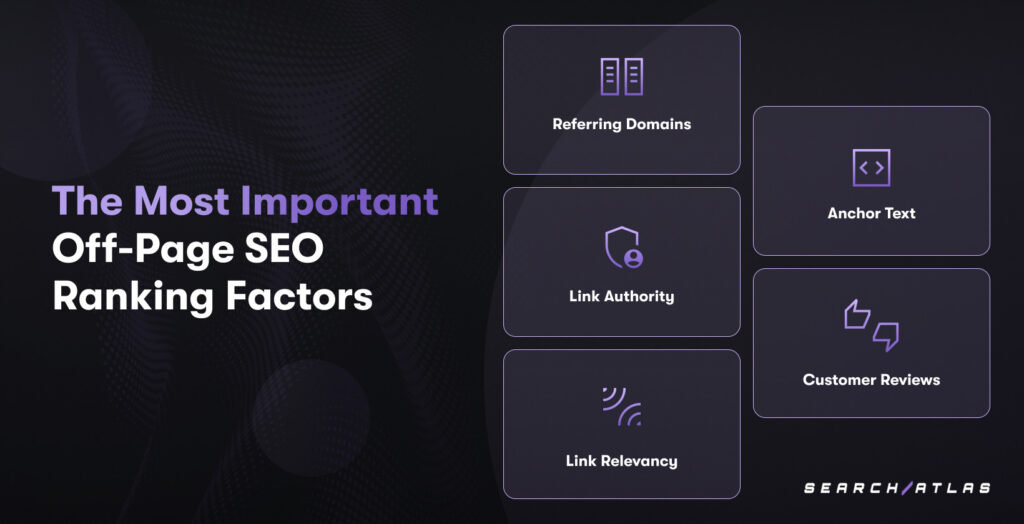
Off-page SEO ranking factors determine how search engines evaluate a website’s authority, credibility, and relevance based on external signals. The off-page SEO ranking factors influence how Google and other search engines perceive your website’s reputation and trustworthiness compared to competitors. Understanding and optimizing SEO ranking factors creates a stronger foundation for sustainable search visibility.
Search engines use sophisticated algorithms to analyze off-page signals, assessing quantity, quality, relevance, and natural growth patterns. Recent algorithm updates have placed increasing emphasis on the contextual relevance of backlinks rather than sheer numbers, making strategic off-page optimization more important than ever. The most authoritative websites typically have diverse off-page signals from multiple high-quality sources.
The most important off-page SEO ranking factors are listed below.
- Number of Referring Domains. The number of referring domains represents the total count of unique websites linking to your site. Search engines interpret links from multiple domains as independent votes of confidence, with each new quality domain adding to your site’s perceived trustworthiness. Per Google’s PageRank algorithm and subsequent refinements, links remain one of the most influential ranking factors in the search engines’ complex adaptive system.
- Link Authority. Link authority serves as a primary indicator of your website’s authority and reach across the internet. To evaluate link authority effectively, analyze metrics like Domain Authority (DA) or Domain Power (DP). Domain Power, established by Search Atlas, provides standardized measurements of a domain’s strength based on its backlink profile and other trust signals, helping prioritize link-building efforts toward the most valuable opportunities.
- Link Relevancy. Link relevancy measures how closely related the linking website’s topic is to your website’s subject matter. Relevant links from sites within your industry or niche carry more weight than irrelevant links, regardless of the linking site’s general authority. Link relevancy operates on multiple levels, including website-level relevance (industry alignment), page-level relevance (topic similarity), and contextual relevance (surrounding content).
- Anchor Text. Anchor text refers to the clickable words used in hyperlinks pointing to your website. Anchor text provides search engines with contextual clues about your page’s content and topic relevance. The ideal anchor text distribution includes a mix of branded anchors (your company or website name), naked URLs (the actual link address), partial match anchors (containing some target keywords), exact match anchors (precise target keywords), and generic anchors (“click here” or “learn more”).
- Customer Reviews. Customer reviews are a powerful off-page ranking signal influencing search visibility and user decision-making. Customer reviews provide independent verification of your business’s quality and reliability, contributing to search engines’ assessment of your overall reputation. The quantity, quality, and recency of reviews across platforms like Google Business Profile, Yelp, and industry-specific review sites all contribute to your off-page SEO profile.
How To Do Off-Page SEO?
Off-page SEO requires a strategic approach that builds quality external signals while avoiding tactics that could trigger search engine penalties. The off-page SEO process combines multiple techniques to create a diverse and natural-looking profile of external signals that collectively enhance your website’s authority and visibility.
The 4 essential steps to implement off-page SEO effectively are listed below.
- Identify your off-page SEO objectives. Define specific, measurable objectives that align with your overall business goals before starting any off-page SEO campaign. Setting clear objectives ensures that your off-page activities deliver meaningful results, exceeding vanity metrics. Practical objectives connect directly to business outcomes like revenue growth, lead generation, or market share expansion.
- Perform your off-page SEO audit. Perform an off-page SEO audit of your current external signals to identify strengths, weaknesses, and opportunities for improvement. An off-page SEO audit establishes a baseline for measuring future progress while revealing the most impactful areas for immediate optimization.
- Start your off-page SEO campaigns. Implement targeted off-page SEO campaigns that address your specific off-page needs once you’ve established objectives and completed your audit. Allocate resources based on your audit findings, focusing more effort on areas with the largest gaps or highest potential impact. Create a balanced approach that builds authority through both quick wins and long-term relationship development with industry publications and influencers.
- Track your off-page SEO results. Track and analyze your off-page SEO results regularly to allow for data-driven optimization and demonstrate the ROI of your efforts. Effective tracking connects specific off-page activities to measurable improvements in rankings, traffic, and conversions. Use tools like Google Analytics, Google Search Console, and Search Atlas to collect comprehensive data across all off-page channels.
What Are the Off-Page SEO Techniques?
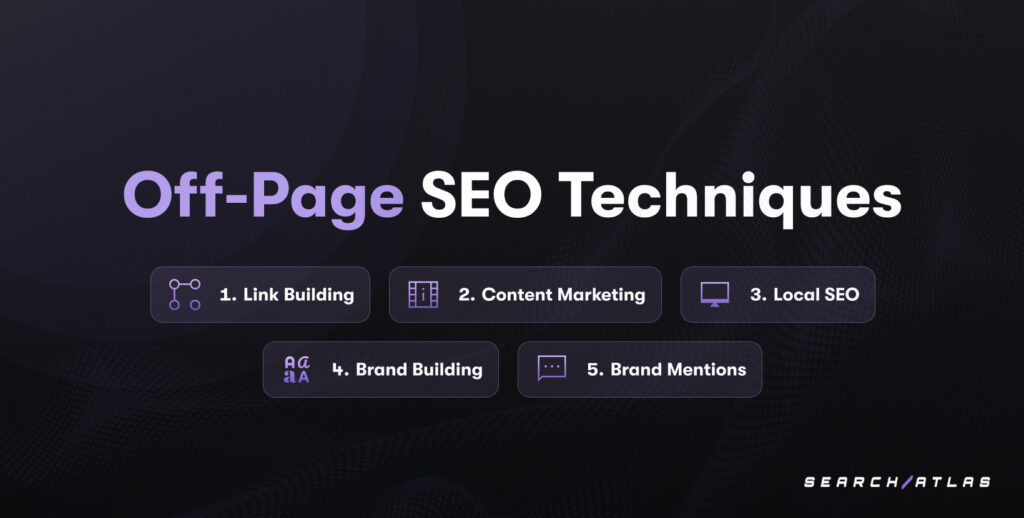
Off-page SEO techniques encompass all external activities that enhance your website’s authority, credibility, and visibility in search results.
The five most effective off-page SEO techniques are listed below.
1. Link Building
Off-page link building involves acquiring hyperlinks (backlinks) from other websites to your own, creating pathways for users and search engine crawlers to discover your content. These hyperlinks function as votes of confidence that signal your website’s value and authority to search engines.
To identify which websites you should acquire backlinks from, access the Search Atlas’ Backlinks panel.
Navigate to the Search Atlas Link Gap Analysis Tool, which identifies the backlink gap between your website and competitors. The Search Atlas Link Gap Analysis Tool provides a list of websites, their Domain Authority scores, spam scores, and the top linking page for each competitor.

These insights give you the direction you can take when it comes to building your linking strategy. There are different approaches to link building. The three main approaches to link building are explained below.
Guest Blogging
Guest blogging involves writing and publishing articles on relevant external websites to build backlinks and authority. Guest blogging provides mutual benefits, with host sites receiving quality content while you gain exposure and valuable backlinks. The most effective guest blogging focuses on delivering genuine value to the host site’s audience rather than simply acquiring links.
Guest blogging increases website credibility, referral traffic, and brand exposure while establishing industry expertise.
Reach out to the website you want to acquire links from, look for and access their contact page, and offer a guest blogging opportunity. Write SEO-friendly, helpful, and relevant content related to your industry. In the example below, Manick Bhan reached out to WordStream to write about SEO, included himself as the author, and linked back to his website.
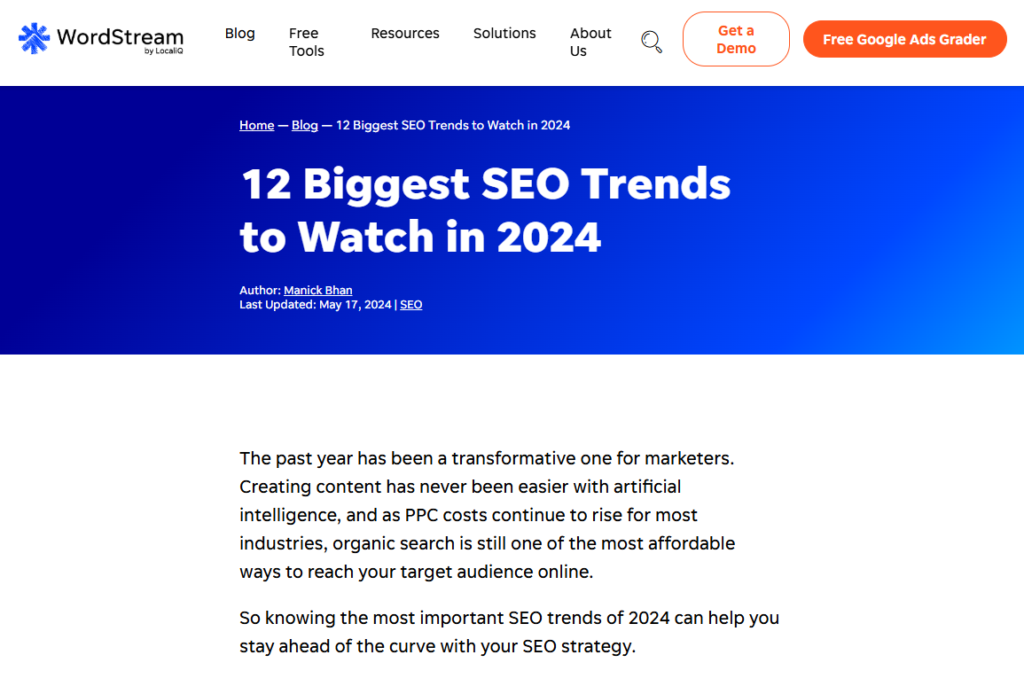
Broken Link Building
Broken link building, also known as dead link building, is the practice of identifying broken links on high-quality websites and suggesting your content as a replacement. This white-hat technique provides immediate utility to the website owner while securing a contextually appropriate backlink that reinforces your entity’s position within the knowledge graph. The broken link building approach is particularly useful because it solves a problem for the website owner rather than requesting a favor.
Best practices for broken link building are listed below.
- Identify resource pages and content hubs within your semantic ecosystem.
- Systematically analyze target sites for broken connections using specialized tools.
- Develop comprehensive replacement content that exceeds the value of the original broken resource.
- Craft personalized outreach communications that emphasize mutual benefit and semantic relevance.
- Follow up appropriately to ensure the successful implementation of your suggested replacement.
- Ensure your replacement content fully addresses the topical intent of the original link.
Search Atlas Site Audit Tool identifies broken links on relevant target websites. In the Audits List, enter the website’s URL from which you want to acquire backlinks, hit the Audit Site button, and perform a site audit. The Issues section within the Search Atlas Site Audit Tool shows broken external links.
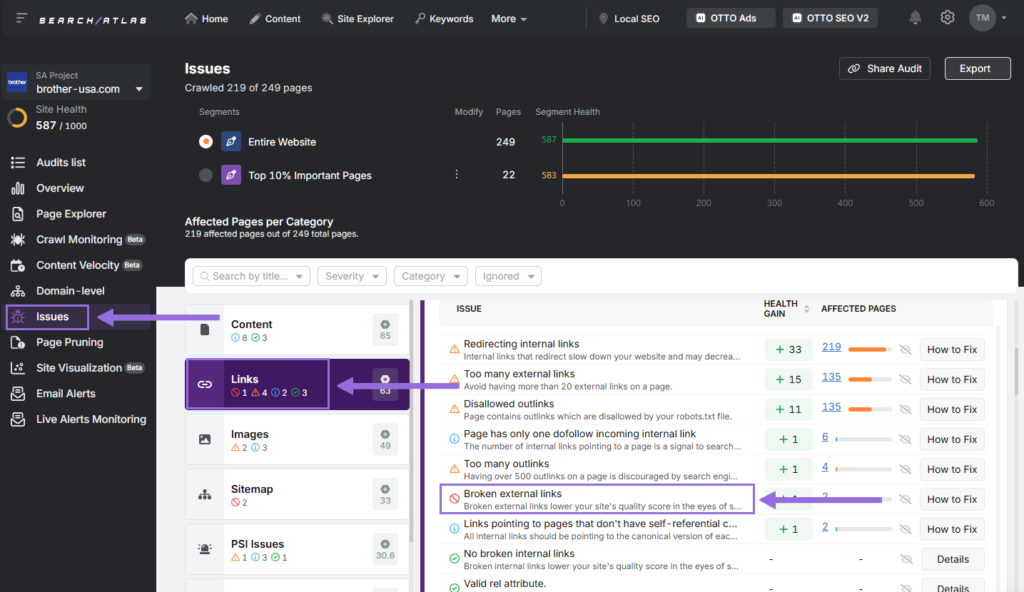
Access the website, find the contact information, and offer to replace the broken backlinks with links to your website. Make sure the content is relevant to your industry and business, and that the anchor text is adequate.
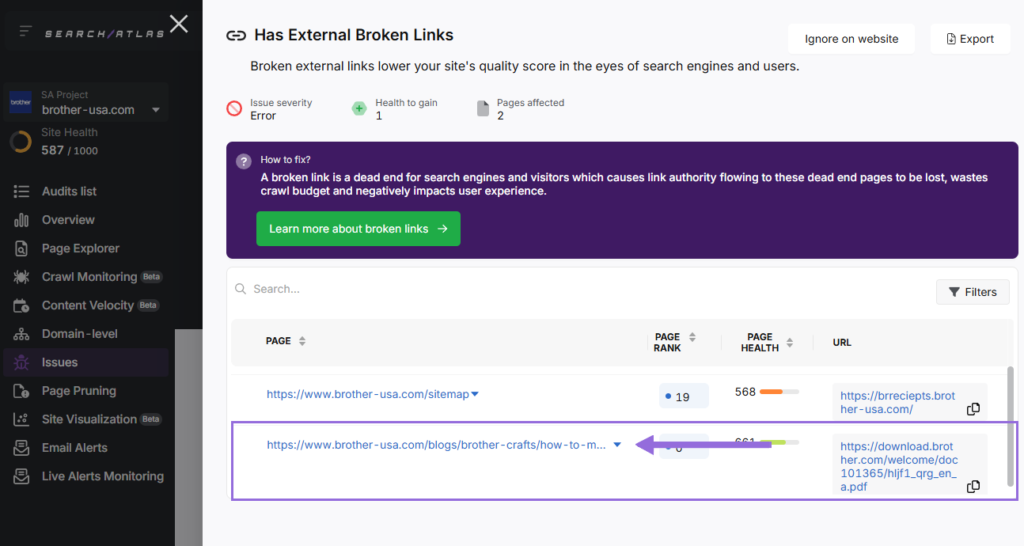
Resource Page Link Building
Resource page link building consists of getting listed on curated pages that link to valuable industry resources. A resource page is a curated webpage that lists valuable links, tools, or references on a specific topic to help users find relevant information. The resource pages are specifically designed to provide collections of valuable links, making them ideal targets for relevant backlink acquisition.
Resource page link building generates consistent, qualified referral traffic from engaged, information-seeking visitors and establishes long-term link placements within stable, maintained resource collections. To successfully engage in resource page link building, follow the tips below.
- Discover resource pages using semantic search operators (e.g., “recommended resources” + [your primary entity] + [related entities]).
- Develop comprehensive, uniquely valuable content that fills identifiable gaps in existing resource collections.
- Craft personalized outreach communications that establish your content’s distinctive contribution.
- Explicitly articulate how your content enhances the resource page’s value proposition for their specific audience.
- Position your content as complementary to (rather than competitive with) existing resources.
- Include supporting evidence of your content’s authority, such as social proof or expert endorsements.
A simple Google search can help you find a perfect candidate, access the resource page’s contact information, and offer to sponsor a backlink to your website.

Digital PR
Digital public relations (PR), also known as online public relations or E-PR, is the use of media outreach, top press release distribution services, and journalist connections to gain brand mentions and backlinks. This strategy positions your brand as a thought leader while securing high-authority coverage that builds both immediate visibility and long-term SEO value through prestigious backlinks.
Successful digital PR earns authoritative backlinks from high-domain-authority sites, increases brand awareness and recognition, builds brand credibility and trust signals, and generates significant referral traffic. The best practices for digital PR are listed below.
- Create newsworthy content based on original research, studies, surveys, or data analysis.
- Build relationships with journalists and media outlets in your industry.
- Monitor industry news for timely opportunities and trending topics.
- Distribute press releases strategically to relevant publications.
- Leverage trending topics and newsjacking for timely exposure.
Signal Genesys, PR Newswire, Business Wire, PRWeb,
eReleases and Cision PR Web are some of the top press release distribution services to use for your digital PR efforts.
Search Atlas can further enhance your outreach campaigns using the specialized Search Atlas Digital PR Tool. The Search Atlas Digital PR Tool allows you to automatically find and reach out to bloggers, editors, and publishers.
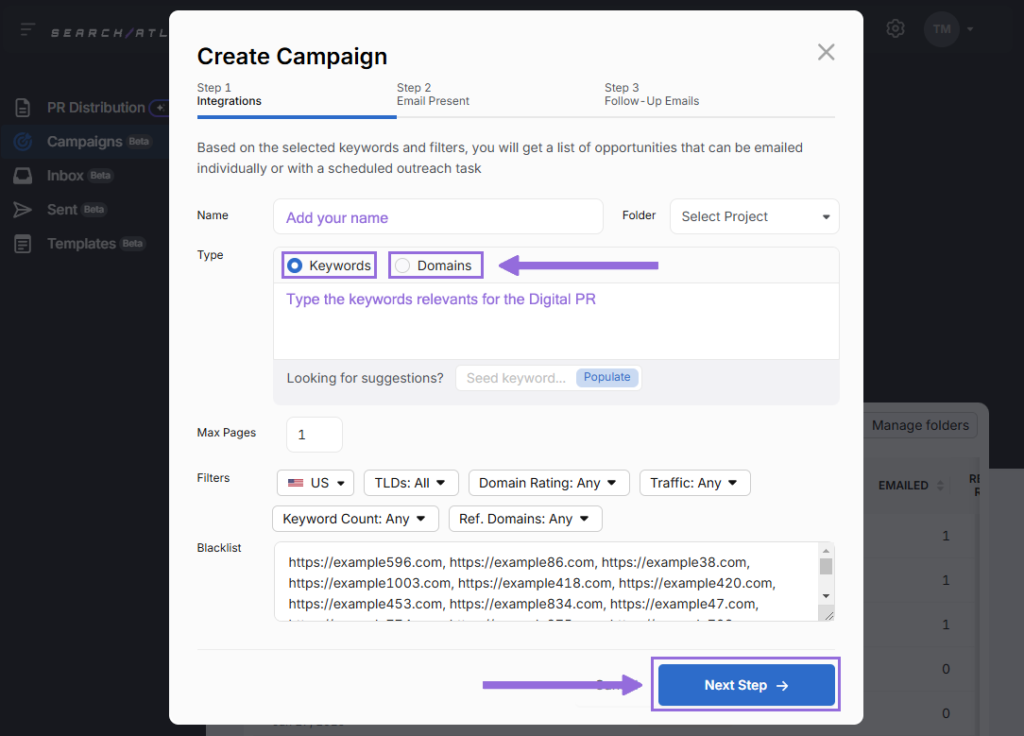
2. Content Marketing
Content marketing involves creating and distributing valuable, relevant content to attract and engage a target audience while naturally earning backlinks and social shares. The content marketing strategy focuses on developing high-quality assets that address audience needs and naturally attract attention from other websites, influencers, and social media users. Content marketing builds sustainable off-page signals through genuine value rather than direct outreach.
Content marketing serves as a cornerstone of effective off-page SEO through six main techniques. The techniques to distribute the content are listed below.
Social Media Marketing
Social media marketing uses platforms like Facebook, X (previously Twitter), LinkedIn, and Instagram to connect with your audience, build your brand, increase sales, and drive website traffic. Social media marketing increases brand awareness through an expanded digital footprint, improves community engagement and customer loyalty, and creates opportunities for content amplification and virality.
To efficiently establish your social media presence, follow the tips below.
- Choose platforms where your target audience actively engages.
- Create platform-specific content optimized for each channel’s format.
- Maintain consistent posting schedules using content calendars.
- Engage actively with followers, commenters, and industry leaders.
- Include trackable website links in profiles and relevant posts.
- Analyze engagement metrics to refine content strategy.
You can use Search Atlas Content features to create content to be shared on social media with the Search Atlas AI Content Templates Tool. The Search Atlas AI Content Templates Tool lets you search for the template of social media content, like Facebook Ads, LinkedIn Post, or Tweet. Select Try this template on your template of choice.
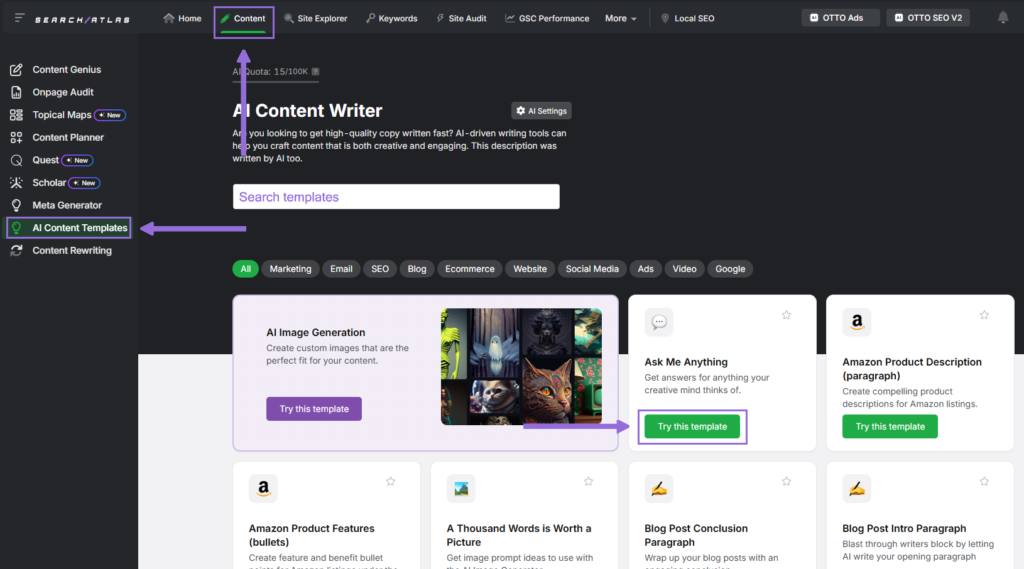
Fill out the spaces with the necessary information and hit Generate AI Content to create the social media content.
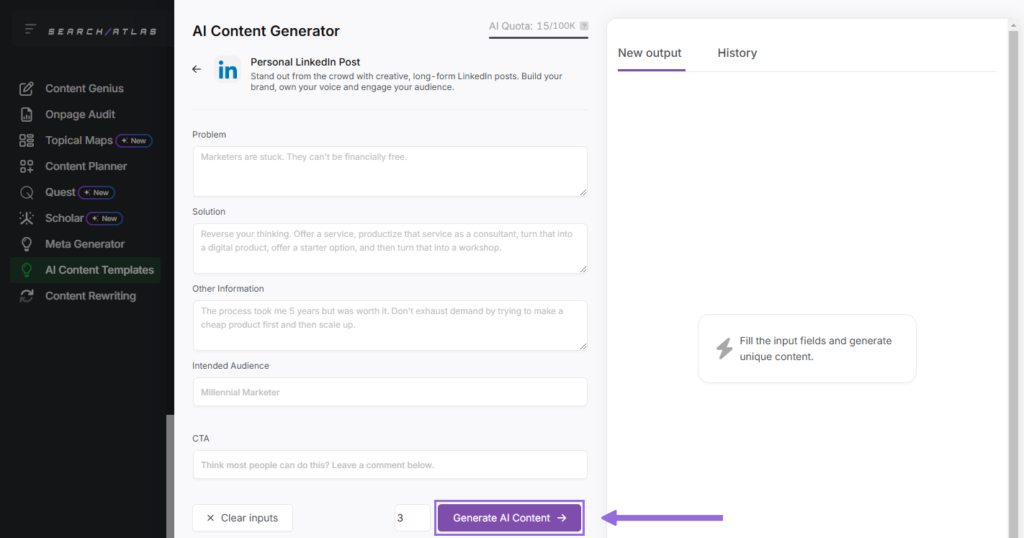
Influencer Marketing
Influencer marketing involves partnering with influential personalities in your industry to promote your content, products, or services to their established audiences. Influencer marketing leverages the trust and authority that influencers have built with their followers to enhance your brand’s visibility and credibility. Influencer collaborations often result in high-quality backlinks, brand mentions, and social signals that support off-page SEO objectives.
To find influencers, search on Google for your industry or topic of interest plus the word influencers or similar words with similar meanings, like social media personalities, industry experts, creators, digital marketers, or key opinion leaders (KOLs). For the most effective influencer marketing, choose influencers aligned with your brand values and target audience, and focus on engagement rates and audience quality over follower counts.

Podcasts
Podcasts involve creating audio content on industry topics to educate and connect with audiences while establishing thought leadership and earning backlinks from podcast directories, show notes, and listener resources. The podcast medium offers unique advantages for off-page SEO by reaching audiences that prefer audio content while providing opportunities for authoritative backlinks through guest appearances and content mentions.
Podcasts establish thought leadership, foster brand loyalty, and reach new audiences through podcast platforms. Applying SEO for podcasts involves optimizing episode titles, descriptions, and transcripts to improve discoverability and search rankings. To create a podcast, you need to choose your podcast format and set up podcast equipment. Choose a podcast software, like Podcastle, Riverside, or Podbean.
Choose a suitable guest within your industry or a complementary industry, reach out to them, and record your first episode. Choose the platforms to publish the podcast, like YouTube, Spotify, and Apple Podcasts.
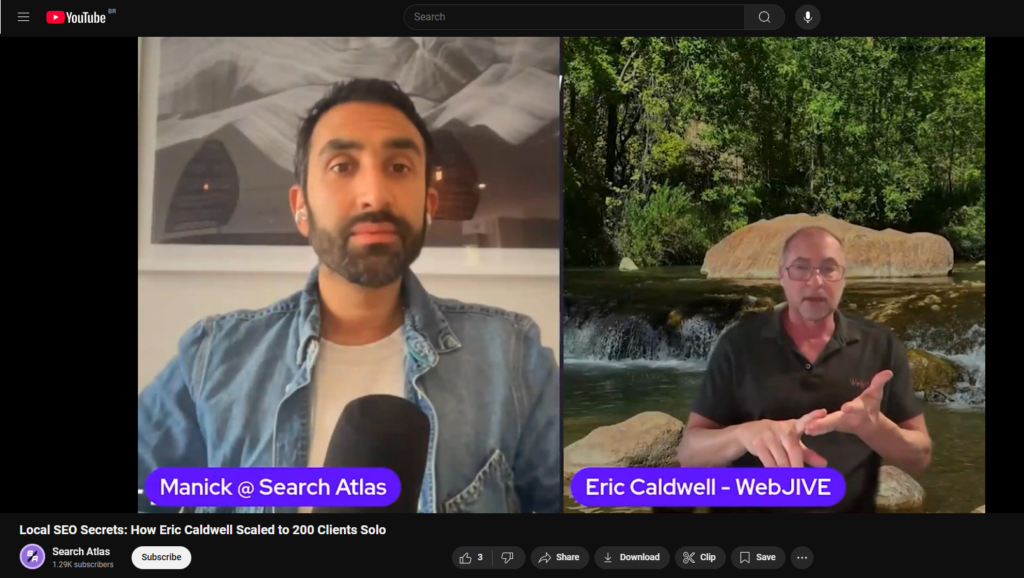
Content Syndication
Content syndication is the practice of republishing existing content on third-party platforms to reach a wider audience while acquiring backlinks and increasing content visibility. This strategy multiplies the value of your content by exposing it to new audiences across different platforms. When implemented correctly with proper attribution and canonical tags, content syndication provides off-page benefits without creating duplicate content issues.
For effective content syndication, choose reputable platforms that align with your audience and industry to maximize reach without diluting your brand authority. Publish content on your website first to establish original source status and then adapt the content format to match the requirements of each platform.
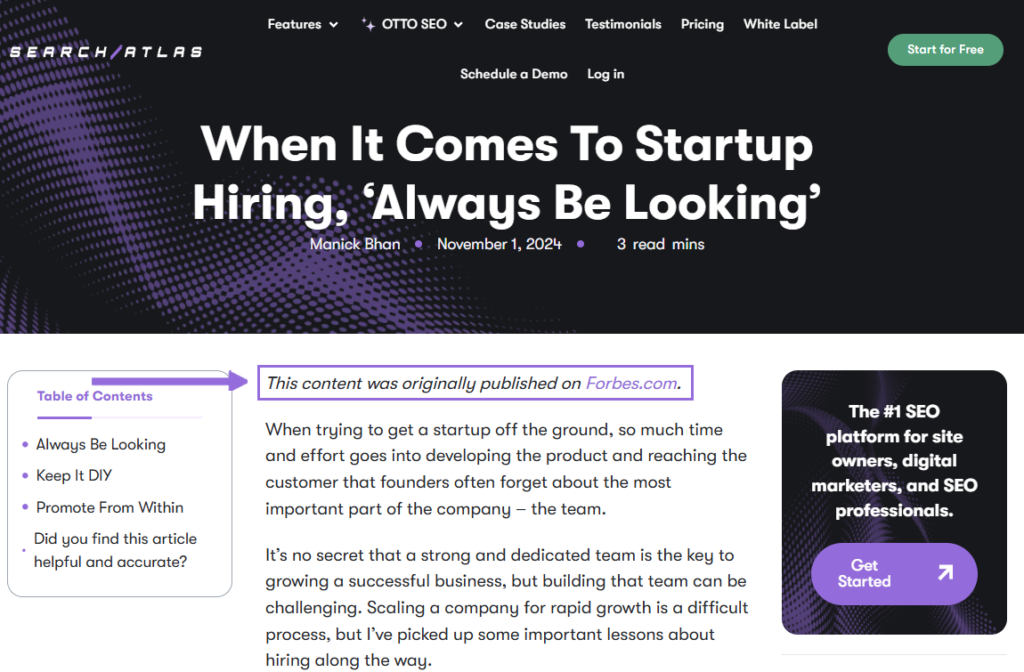
Forums and Q&A Sites
Forums and Q&A site engagement involves actively participating in industry discussions on platforms like Quora, Reddit, and specialized forums to build authority, drive traffic, and create brand awareness. Forums and Q&A sites can be particularly effective when used strategically, as these platforms allow you to answer industry-related questions, share insights, and gain visibility among relevant audiences. Search engines recognize high-quality engagement as a credibility signal, strengthening your off-page SEO efforts.
You should become a regular contributor to build a reputation and trust. Use Quora SEO strategies to answer questions thoroughly with evidence-backed information, and include relevant links only when they directly address the question. Monitor questions related to your expertise using keyword alerts as a part of a Reddit SEO game plan.
To find discussions in forums, threads, or boards, search for the topic of interest on Google and click on the Forums tab.

Video Marketing
Video marketing consists of creating and distributing video content to engage audiences, improve brand awareness, and earn backlinks from video platforms and embedded content. Video marketing capitalizes on the growing preference for video content across demographics, creating opportunities for increased engagement and natural link acquisition. Video SEO content often earns links more easily than text-based content due to its visual appeal and shareability.
To excel at video marketing, create high-quality, engaging content tailored to the platform, whether it’s YouTube, TikTok, Instagram, LinkedIn, or Facebook. Optimize videos with compelling titles, descriptions, and relevant keywords to improve discoverability.
Keep content concise and visually appealing while maintaining a clear message that resonates with your target audience. Use video SEO strategies to encourage interaction by adding calls to action, responding to comments, and leveraging platform-specific features like hashtags or subtitles.
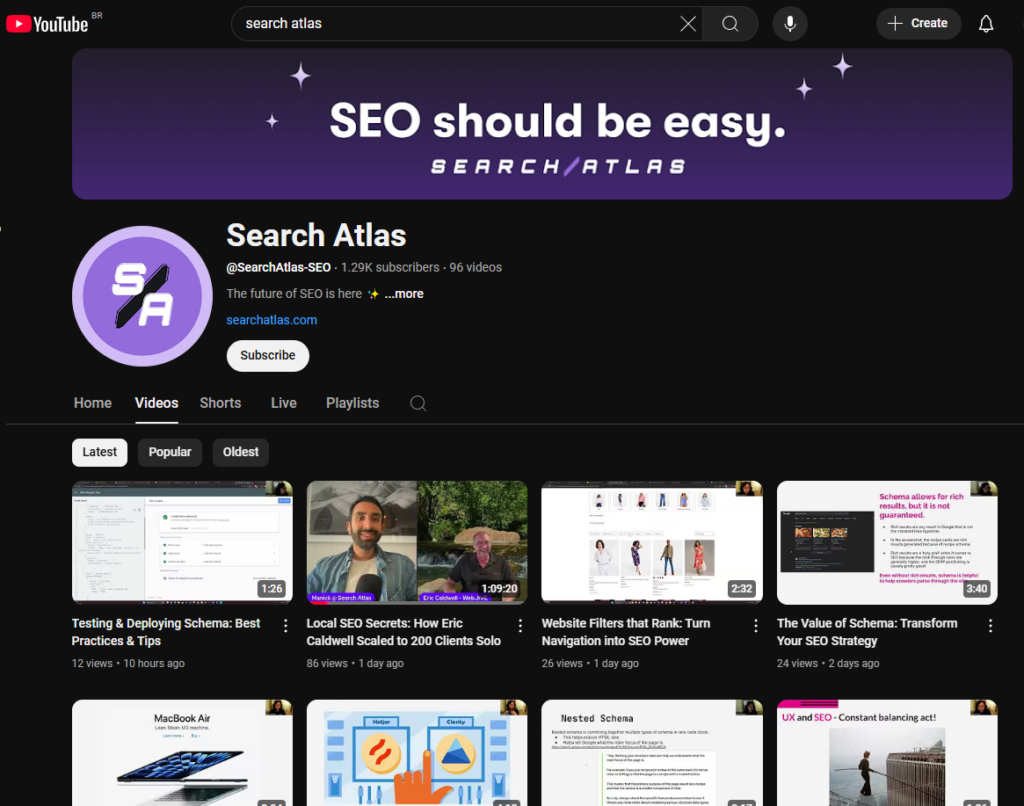
3. Local SEO
Local SEO involves optimizing a business’s online presence to attract customers in specific geographic areas through improved visibility in location-based searches. This strategy focuses on enhancing your business’s prominence in local search results, Google Maps, and business directories. Local SEO combines on-page location signals with off-page citation building to establish geographical relevance and authority.
Local SEO encompasses four critical off-page elements, listed below.
Google Business Profile
Google Business Profile (GBP; formerly Google My Business) is a free tool that lets you manage how your business appears on Google Search and Maps. Google Business Profile provides essential business information to searchers, enables customer reviews and ratings, and offers insights on customer searches.
Make sure to claim and verify your business listing through Google’s verification process, complete all information fields with accurate, consistent business details, and keep hours, special events, and temporary changes updated. Upload high-quality images of products, services, and facilities to your Google Business Profile, and respond to all customer reviews promptly, both positive and negative.
To identify the gaps in your GBP and make instant improvements, use the GBP Optimization feature in the Search Atlas GBP Automations Tool.
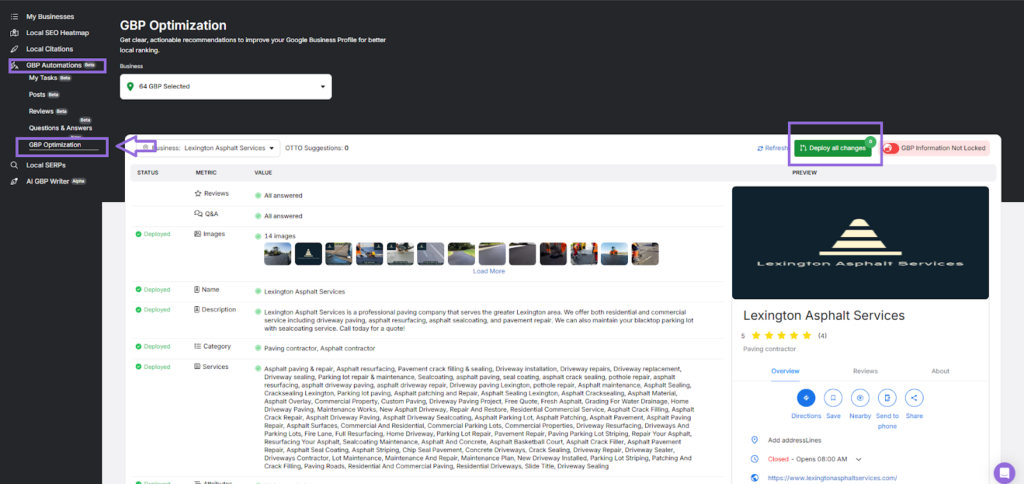
Search Atlas GBP Automations Tool allows you to see all the changes you should make to optimize your Google Business Profile and deploy them automatically, with a single click.

Local Citations
Local citations are brand signals and involve mentions of a business’s name, address, and phone number (NAP) across the web. Citations are references to your business information on websites, directories, and social platforms that serve as trust signals to both users and search engines. Local citations validate your business’s existence and relevance in specific geographic areas, contributing significantly to local search visibility.
Leveraging local citations improves local search rankings through data consistency, increases online visibility across the local digital ecosystem, and helps customers discover your business location information.
Ensure perfect consistency in NAP information across all citations, focus on industry-specific and location-specific citation sources, and fix incorrect citations immediately to prevent ranking issues.

Directory Listings
Directory listings place your business information on online directories, like Foursquare, Data Axle, Neustar, and industry-specific sites, creating a network of citations that collectively strengthen your local search visibility.
Directory listings enhance business discovery in industry-specific directories, build domain authority through quality backlinks, and generate targeted referral traffic from local searchers.
The Search Atlas Local Citations Tool simplifies the citation submission to directory listings by distributing your business information to five major data aggregator networks: Foursquare, Data Axle, Neustar Localeze, Yellow Pages (YP) Network, and GPS Network. The Search Atlas Local Citations Tool offers comprehensive tracking of citation status and value, along with detailed notes on each citation site’s specific guidelines.
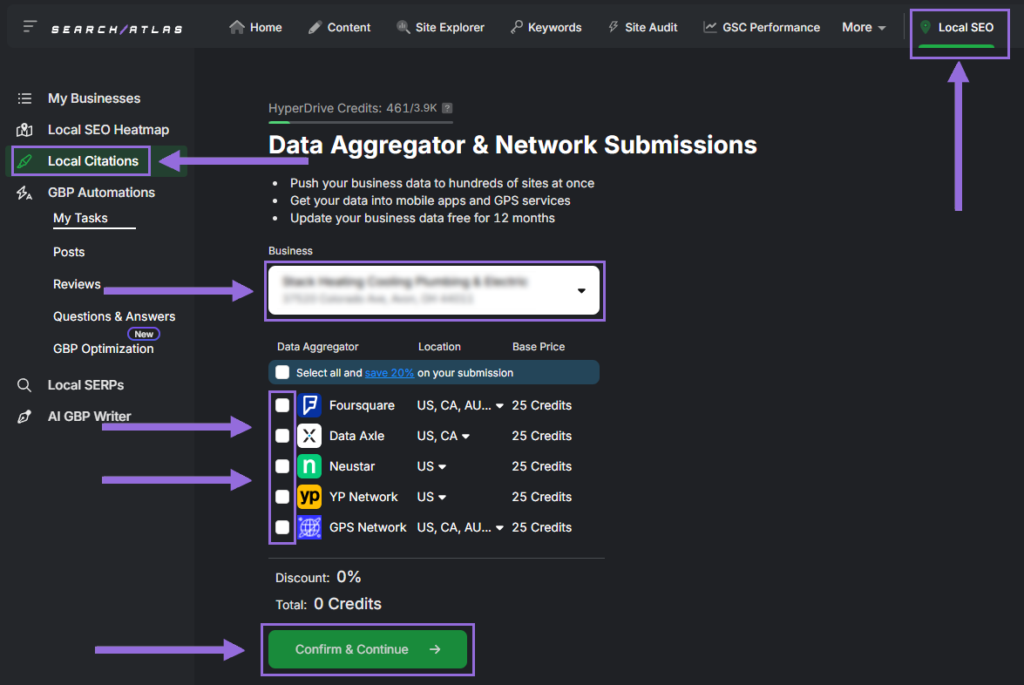
Reviews
Reviews are brand signals that consist of receiving customer feedback on platforms like Google, Yelp, and Trustpilot that influence brand perception and search rankings. Customer reviews serve as powerful trust signals that influence both customer decisions and search algorithms. The quantity, quality, and recency of reviews all contribute to your business’s perceived relevance and reliability for local searches.
Search Atlas Local SEO enables you to reply to customers’ reviews automatically. Get to the Search Atlas Local SEO panel, click on GBP Automations, then Reviews. Select your business and click on Confiture Auto Responding.
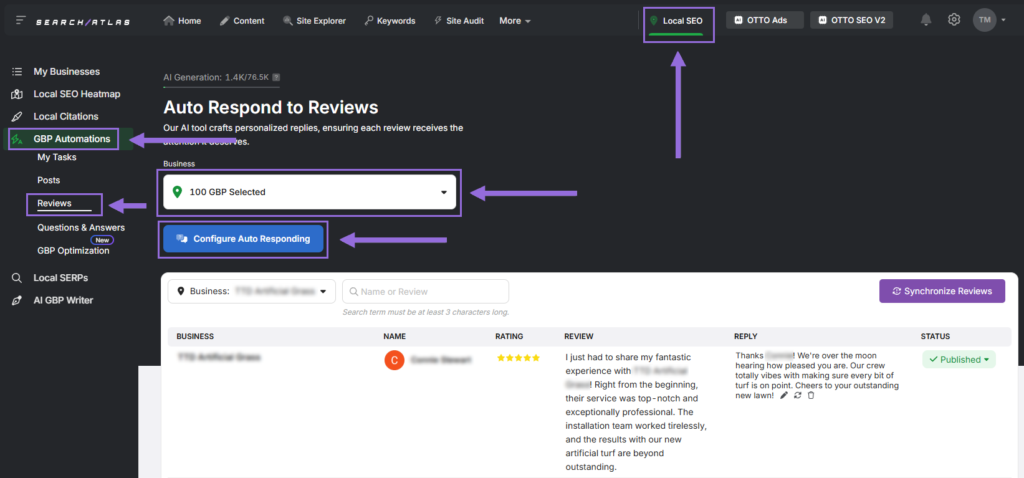
You select your local business, the tone of voice, the length of the answers, and the language. You can also configure what the tool should do for each review, depending on the number of stars, if it should auto-reply with AI, auto-reply with AI and need approval before posting, use a static template, or do nothing.
4. Brand Building
Brand building is the practice of developing a recognizable and trustworthy identity through consistent messaging, marketing efforts, and quality customer experiences. The brand-building approach focuses on establishing your brand’s unique value proposition and building awareness among your target audience. Strong brands naturally attract more attention, mentions, and links, creating valuable off-page signals without direct outreach.
You should develop a consistent brand voice and visual identity and create valuable content that reflects your brand values. Ensure organic brand building by engaging with your audience authentically, participating in community events and sponsorships, and monitoring and managing your online reputation.

5. Brand Mentions
Brand mentions are references to your brand name across the web, with or without a direct link. These unlinked citations contribute to your overall online presence and serve as recognition signals to search engines. Google’s patents indicate that the search engine monitors brand mentions as part of its evaluation of website authority and relevance, making unlinked mentions valuable even without the direct ranking benefit of a backlink.
For effective brand mentions, ensure your brand name is consistently used across online platforms and associated with relevant keywords to strengthen search visibility.
To monitor your brand mentions, access Google Alerts, click on Show options, add the brand’s name, choose how often you want to be alerted, the sources, language, region, how many results, and the email to be delivered to. Hit Create Alert to be automatically alerted whenever the brand is mentioned across the web.
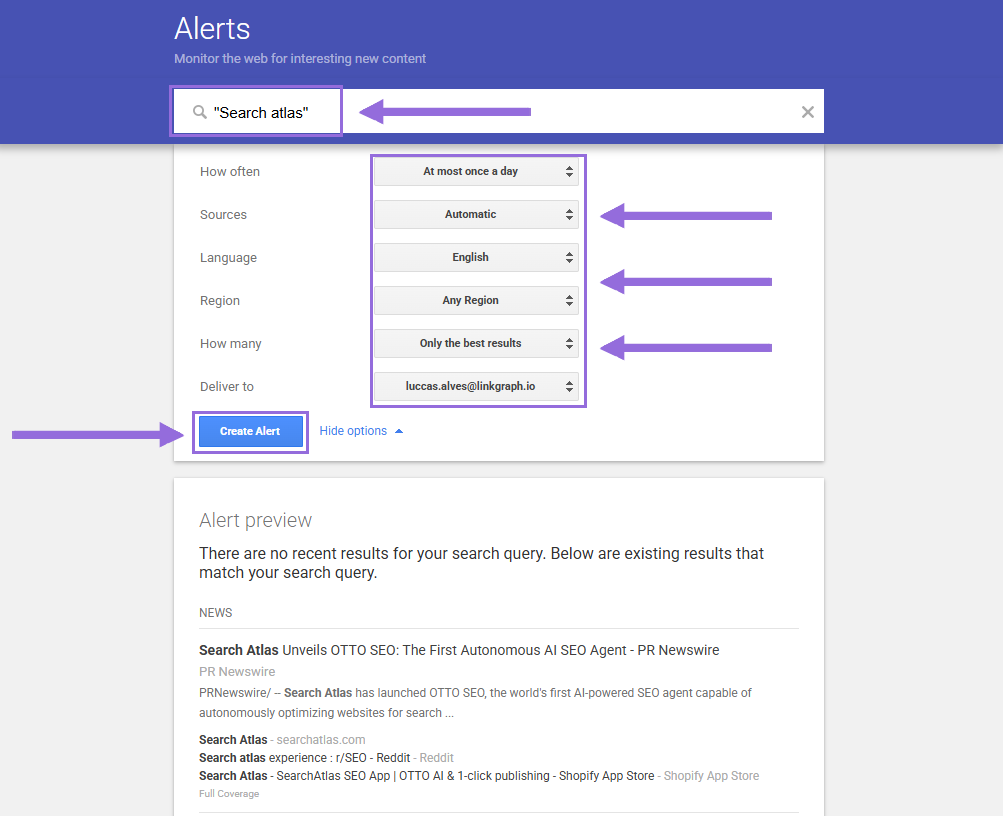
How to Improve Off-Page SEO Using Search Atlas OTTO SEO?
Search Atlas OTTO SEO automates off-page SEO optimizations in seconds, ensuring websites build authoritative backlink profiles, enhance brand visibility, and establish strong external signals that boost search rankings. Users can apply fixes site-wide or individually, allowing precise control over off-page SEO improvements while ensuring continuous monitoring and optimization.
There are 4 categories of off-page SEO issues that Search Atlas OTTO SEO fixes automatically. The categories of issues that Search Atlas OTTO SEO fixes automatically are listed below.
- Cloud Stacks. Search Atlas OTTO SEO’s Cloud Stacks module builds high-quality backlinks by automatically publishing optimized content across cloud-managed services networks. OTTO creates topically relevant content for each platform, ensuring natural keyword integration and contextual fit for maximum SEO benefit. The system distributes this content strategically, establishing citation networks that significantly enhance domain authority and search visibility.
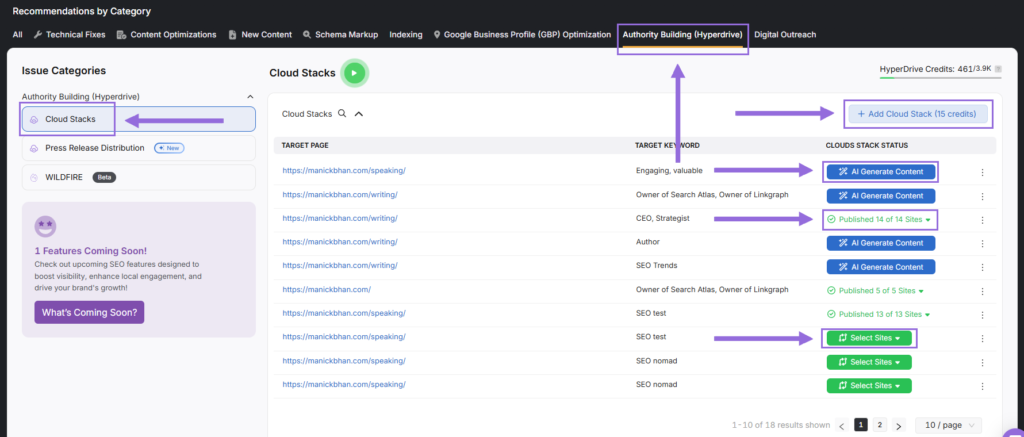
Users can simply click “Add Cloud Stack” in the Authority Building tab, generate AI content for publication, and monitor the results as new backlinks appear across the cloud network.
- Press Release Distribution. Search Atlas OTTO SEO’s Press Release Distribution tool secures authoritative backlinks and brand mentions by syndicating newsworthy content across major media outlets and industry publications. OTTO automatically generates professional press releases based on Knowledge Graph data, incorporating target keywords naturally while maintaining journalistic quality standards. The system then distributes these releases through selected channels, creating valuable off-page signals from trusted news sources.

Users can easily add a new press release, provide basic targeting information, review AI-generated content, select distribution channels, and track performance metrics for each campaign.
- Wildfire Network. Search Atlas OTTO SEO’s Wildfire feature accelerates link acquisition through a vetted exchange network that maintains strict quality controls and relevance requirements. OTTO analyzes potential linking partners for authority, relevance, and risk factors before facilitating exchanges. The system enforces a two-for-one policy (two outbound links for one inbound link), ensuring balanced growth and quality maintenance across the network.
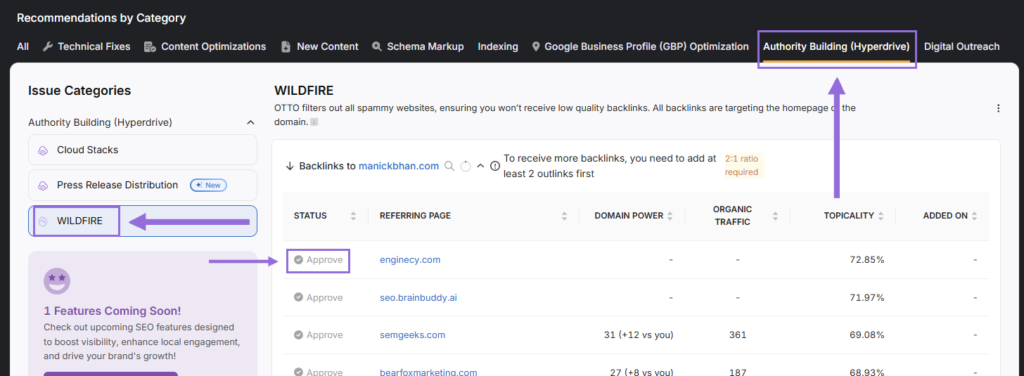
Users review suggested domains in the Authority Building tab, approve appropriate partners, and monitor link health over time while the system handles implementation details.
- Digital Outreach. OTTO SEO’s Digital Outreach campaigns secure guest posting opportunities, editorial features, and media mentions that build authoritative backlinks from industry-relevant websites. OTTO identifies appropriate outreach targets based on domain metrics and content relevance, then personalizes communication to maximize response rates. The system manages follow-up sequences, tracks campaign progress, and documents successful placements automatically.

Users can create new campaigns, monitor inbox communications, and review performance metrics while the system handles the time-consuming aspects of relationship building and outreach management.
When Do You Need Off-Page SEO Optimization?
Off-page SEO should be done at least once a month to maintain momentum and continuous improvement. Different off-page activities require varying frequencies, with social media engagement needing daily attention while backlink audits might only require quarterly reviews.
Off-page SEO optimization should be an ongoing component of your digital marketing strategy, with specific activities scheduled at regular intervals. The consistency and frequency of off-page efforts directly impact their effectiveness, with regular, sustained activities producing better results than sporadic campaigns. Search engines interpret steady growth in external signals more favorably than sudden spikes that may trigger spam filters.
How to Perform an Off-Page SEO Audit?
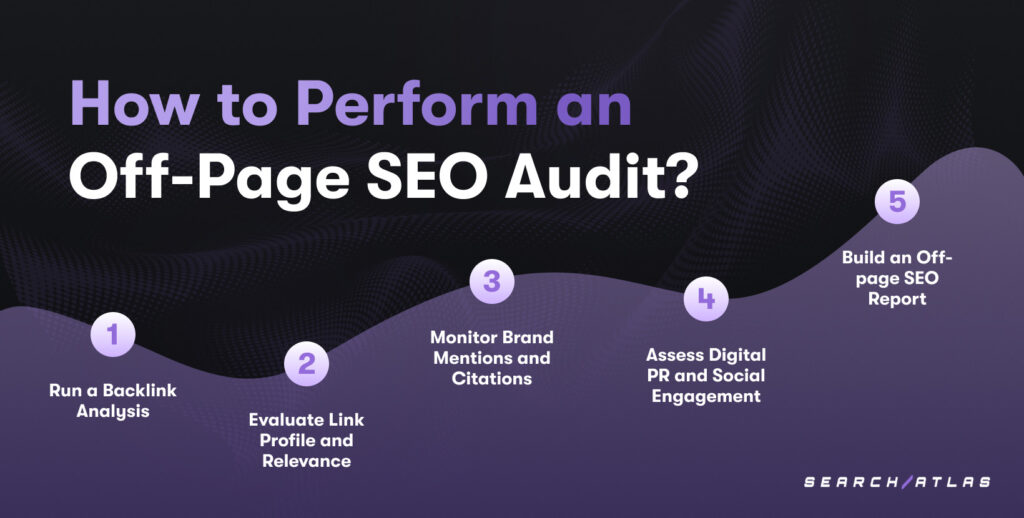
There are five main steps to perform an off-page SEO audit. The 5 main steps to do an off-page SEO audit are listed below.
- Run a backlink analysis. Use the Search Atlas Backlink Analyzer Tool to assess backlink quality, detect toxic links, and evaluate referring domains for diversity and authority. The Search Atlas Backlink Analyzer Tool provides detailed metrics on backlink quantity, quality, anchor text distribution, and growth trends over time. Pay particular attention to the ratio of follow vs. nofollow links, the distribution of link authority, and the relevance of linking domains to your industry or niche.
- Evaluate link profile and relevance. Check the authority and relevance of linking domains, ensuring backlinks come from reputable and industry-aligned sources. Analyze anchor text distribution to maintain a natural link profile. Evaluate your link velocity (the rate at which you acquire new links) against industry benchmarks and your historical patterns.
- Monitor brand mentions and citations. Use Google Alerts to track unlinked brand mentions and convert them into backlinks. Audit your citation profile across general, local, and industry-specific directories to ensure consistent information and identify opportunities for new listings on authoritative platforms.
- Assess digital PR and social engagement. Review press mentions, guest articles, and media coverage for backlink value. Analyze social media interactions and content shares to gauge brand visibility and engagement across platforms.
- Build an off-page SEO report. Summarize key findings, highlight link-building successes and gaps, and provide actionable recommendations to strengthen off-page authority.
What Are the Best Off-Page SEO Tools?
The best off-page SEO tools provide comprehensive data, analysis, and implementation capabilities for managing external signals that influence search rankings. Off-page SEO tools enable efficient monitoring, optimization, and growth of backlinks, brand mentions, social signals, and other off-page factors that collectively determine website authority. The selection of appropriate tools significantly impacts the effectiveness and efficiency of off-page SEO campaigns.
Off-page SEO tools vary in specialization, with some focusing specifically on backlink analysis while others offer broader functionality across multiple off-page factors. Advanced features like competitive analysis, opportunity identification, and automated reporting enhance the strategic value of these tools for comprehensive off-page management.
The best off-page SEO tools include Google’s tools, like Google Search Console (GSC), Google Analytics (GA4), Google Alerts, and AI-driven SEO solutions like the Search Atlas SEO software platform. These tools provide valuable data and automation for enhancing off-site SEO efforts.
The best off-page SEO tools are listed below.
Google Search Console (GSC) monitors the website’s backlink profile, providing insights into backlinks, helping you evaluate link quality, and identifying opportunities for acquiring high-quality backlinks. The GSC Links report shows which websites link to your pages, boosting your authority. The GSC Crawl Errors report highlights external links that need fixing, allowing you to improve visibility and enhance off-page SEO.
Google Analytics 4 (GA4) provides insights into user interactions from external sources. The Referring Sites report helps identify which websites drive the most relevant traffic, allowing you to target high-performing referral sources for link building and partnerships. This data helps refine your off-page SEO strategy, ensuring that efforts to acquire backlinks and collaborate with key websites are focused on those most likely to drive qualified traffic.
Google Alerts enables real-time monitoring of brand mentions, competitor activities, and industry trends by sending notifications when specified keywords appear online. This tool is valuable for off-page SEO as it allows businesses to track unlinked brand mentions, identify potential backlink opportunities, and stay informed about relevant discussions across the web.
Search Atlas SEO Software Platform serves as a comprehensive off-page SEO tool. Search Atlas enhances off-page optimization with AI-driven automation for link building, content marketing, local SEO, brand building, and brand mentions. Its intelligent monitoring system detects changes in link profiles, referral traffic trends, and brand visibility in real time, ensuring a strong off-page SEO strategy. Combining Google’s tools with Search Atlas’s off-page SEO tools creates a complete off-page SEO system.
Is Off-Page SEO still effective for SEO?
Yes, off-page SEO is still very effective for SEO and remains a crucial factor in determining a website’s search engine ranking. Despite continuous algorithm updates and the growing importance of on-page factors, external signals continue to play a fundamental role in how search engines evaluate website authority and relevance. Correlation studies by various SEO professionals consistently show that off-page metrics like referring domains and backlink quality maintain strong relationships with ranking positions across most competitive industries.
Is it Worth Starting an Off-Page SEO Services Company?
Yes, starting an off-page SEO services company is worth it if you have the necessary expertise and can effectively build high-quality backlinks for clients. The market demand for specialized off-page SEO services continues to grow as businesses recognize the complexity and importance of external signals for search performance. The SEO services market is expanding rapidly, with off-page services representing a significant portion of this growth sector.
A link building agency is a good service to start providing, as it addresses one of the most challenging aspects of SEO that many businesses prefer to outsource. The most successful off-page SEO agencies differentiate themselves through specialized expertise in particular industries, proprietary methodologies, or unique relationship networks.
To maximize success, develop well-defined service packages that cater to your target clients’ needs. Consider leveraging a white-label SEO solution like the Search Atlas White-Label SEO to offer fully branded, customizable reports and services under your agency’s name.
What to Know About Off-Page SEO Besides PageRank?
Off-page SEO encompasses all optimization activities that happen outside your website to build authority, credibility, and relevance in the eyes of search engines. While PageRank is an algorithm that focuses specifically on analyzing link quantity and quality to determine webpage importance in search rankings, off-page SEO incorporates a much broader range of external signals that collectively form your site’s digital reputation.
The PageRank algorithm, developed by Google founders Larry Page and Sergey Brin, revolutionized search engines by evaluating websites based on the number and authority of pages linking to them rather than just on-page keyword frequency. PageRank established the fundamental idea that links represent “votes of confidence” between websites, but today’s off-page SEO encompasses user signals, brand mentions, E-E-A-T factors, and various other trust indicators that paint a complete picture of a site’s authority. Understanding this distinction allows marketers to develop comprehensive strategies that build overall digital presence rather than focusing exclusively on link acquisition.
What is the Difference Between Off-Page SEO and On-Page SEO?
Off-page SEO encompasses all optimization activities outside your website to improve its search engine rankings and digital reputation. Off-page signals demonstrate to search engines that others endorse your content’s value and expertise, significantly influencing how your site ranks compared to competitors. The off-site approach typically requires extended timeframes, relationship building with industry websites, and strategic outreach rather than direct technical implementation.
On-page SEO, by contrast, involves optimizing elements directly within your website that you fully control. On-page SEO includes enhancing content quality, strategic keyword placement, HTML code structure, meta tags, internal linking, site architecture, and user experience factors. These optimizations help search engines understand your content’s topic and relevance while providing visitors with a smooth, intuitive experience. On-page SEO techniques deliver an immediate impact since changes can be implemented directly and create the essential foundation for search visibility by ensuring content is properly structured, relevant, and technically accessible.


